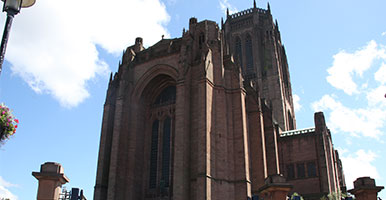Lord William Rodgers
Presented by Professor Frank Sanderson
Honorable Pro-Chancellor, I have pleasure in presenting Baron Rodgers of Quarry Bank for the award of an Honorary Fellowship from Liverpool John Moores University.
Bill Rodgers is one of the outstanding political figures of his generation. He has been active in politics for over 60 years, ever since as a schoolboy he heckled Tory politicians in Liverpool during the 1945 General Election.
Thereafter he was an outstanding constituency MP, served in the Labour Cabinet and at many ministerial levels of government, he was a member of the Gang of Four who defected from the Labour Party to found the Social Democratic Party in 1981, and latterly was the leader for the Liberal Democtrats in the House of Lords. He was appointed a Privy Councillor in 1975.
William Thomas Rodgers was born in 1928 in Wavertree in a Victorian terrace 'behind the tram sheds at the better end of Smithdown Road'. He first attended the Sudley Road Council School before progressing to Quarry Bank High School in Allerton in 1940 - a year he remembers well. One night, 200 people in Liverpool were killed in a German air-raid, and the windows of his home were blown in and the front door blasted off its hinges. At Quarry Bank, he became involved in debating, and developed an interest in socialism, which explains his stint as a heckler.
When Labour took the majority of seats in Liverpool, he was delighted and marked the occasion by giving up Aeroplane Spotter in favour of The New Statesman. Shortly afterwards, feeling strongly that he wanted to do something about class inequalities, he joined the Labour Party.
In 1947 he received an Open Exhibition in Modern History from Magdalen College Oxford, but National Service came first. His time with the King's Regiment showed him what a privileged life he'd led, when he had to read and write letters for others, and finding that most of his fellow soldiers settled arguments by fighting rather than by debate.
After graduating from Oxford in 1951, he worked for the Fabian Society, becoming the youngest ever general secretary in 1953. In 1960, he became executive chairman of the Campaign for Democratic Socialism where he helped Hugh Gaitskell resist the left's move towards unilateral nuclear disarmament.
In 1955 he married the remarkable Berlin-born Silvia Szulman who was a popular and admired figure at Westminster until her death 2 years ago.
Bill entered the House of Commons at the Stockton by-election in 1962, and served in Labour Governments under Harold Wilson and James Callaghan, becoming Secretary of State for Transport in Callaghan's Cabinet in 1976. He held the post until Labour's defeat in the 1979 General Election.
Within the Labour Party he was a highly effective organiser around liberal causes such as multilateral nuclear disarmament and Britain's membership of the European Economic Community. But disillusioned with the increasingly anti-European Labour Party lurching to the left and showing signs of terminal decline, and after much soul-searching, he became one of the so-called Gang of Four, joining Shirley Williams, Roy Jenkins and David Owen in forming the Social Democratic Party in 1981 - described by one commentator recently as 'a seismic event in modern political history' .
This event might have had even greater impact had they chosen not The SDP but one of the other proposed titles for the Party - New Labour. Indeed the SDP is seen by many political commentators as the prototype New Labour, 15 years ahead of its time. At the 1983 general election the SDP-Liberal Alliance won 25 percent of the votes but only 23 seats, and Bill lost his seat at Stockton. However, he remained vice-president of the party and later became chairman of the "Yes to Unity" campaign to merge it with the Liberal Party, thereby creating the Liberal Democrats.
During this period out of Parliament, he served for over 6 years as the Director-General of the Royal Institute of British Architects, after which he was awarded on honorary fellowship from RIBA, and a further 6 years as Chairman of the Advertising Standards Agency.
In 1992, Bill he was made a Life Peer, adopting the title of Lord Rodgers of Quarry Bank.
Two years later, he became the spokesman for the Liberal Democrats in the Lords, and then succeeded his friend Lord Jenkins as the leader of the Lib Dems in the Lords. During his tenure, the majority of the hereditary Peers were removed from the House which had the effect of making his party pivotal in improving legislation.
Bill retired as leader in 2001 in order to ensure complete recovery from a life-threatening illness.
Bill Rodgers was widely regarded as a model constituency MP: Charles Kennedy observing that despite serving in the Cabinet and at many ministerial levels of government, "his concern for his constituents and his strong determination to help those in need never wavered". He has also been described as highly professional, undogmatic, fair-minded, noted for his keen political judgement, and possessing outstanding administrative skills.
The title of his very readable autobiography Fourth among Equals reveals another virtue - lack of pretence. In it he reveals his life-long emotional attachment to Liverpool which he always remembers with great affection.
Bill has much to be proud of in a distinguished and momentous political career. He has been an outstanding politician as a constituency MP, as a cabinet minister, as a co-founder of a new party, and as a leader of the Liberal Democrats in the House of Lords. Today, we wish to acknowledge the fact that he has served his country well.
Thus I have pleasure in presenting The Right Honorable Baron Rodgers of Quarry Bank, this most distinguished son of our city, for admission to our highest honour of Fellow of Liverpool John Moores University.



